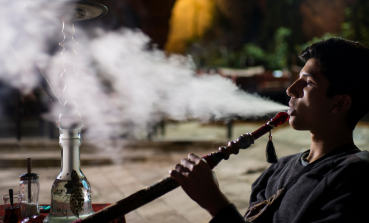Using AI to control energy for indoor agriculture
30 September 2024
Published online 25 September 2016
Researchers hope to dispel misconceptions about the safety of water-pipe smoking.

© Joerg Boethling / Alamy Stock Photo
Sustained exposure to tar, nicotine and smoke, communal water pipe smoke dispensers and the presence of cancer-producing agents in the traditional water pipe, known as shisha or hooka, have all been proven causes of bronchitis, emphysema, tuberculosis, periodontal disease and cancers of the lung, esophagus and head and neck.
A study conducted at Weill Cornell Medicine-Qatar into 22 research projects and published in the International Journal of Public Health has shown that they concur that the use of water pipes is harmful and, like cigarettes, has addictive properties.
"Any form of tobacco smoking is a public health evil."
The pastime is popular in the Arab world, with clubs and hooka bars common in most countries.
Ravinder Mamtani, the lead researcher of the meta-analysis explains that water pipes are made more attractive because the tobacco is soaked in molasses or honey, and then flavored with agents replicating apple, mint, chocolate or floral scents.
The mechanism of the water pipe includes a water compartment where the smoke passes through before it’s inhaled. “In the minds of most people that means any harmful substances such as tar and carcinogenic compounds in smoke are filtered out before smokers inhale smoke from shisha,” Mamtani says. “This is completely untrue.”
Mamtani adds that just like cigarettes, shisha smoke contains nicotine.
In a 60-minute waterpipe/hookah session, smokers are exposed to 100 to 200 times the volume of smoke inhaled from a single cigarette. While the average smoking session would last about five minutes for cigarettes, it’s 45 minutes to an hour, if not more, in a water pipe.
The study’s authors believe that longevity of hooka in popular Arab culture, in addition to limited interest and funding for research into its effects, have allowed common misperceptions about its dangers to flourish.
The meta-analysis is just the beginning of investigations for Mamtani et al. They hope to continue working collaboratively with other researchers and local health institutions to further understanding of shisha risks.
“It will be worthwhile to examine the social and behavioral determinants of shisha smoking in the Middle East, particularly amongthe young,” he says. “Any form of tobacco smoking is a public health evil, which needs to be addressed urgently.”
doi:10.1038/nmiddleeast.2016.138
Stay connected: